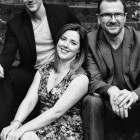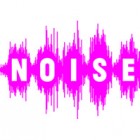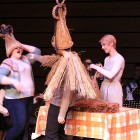Hirda 2015New Opera in Scotland Events (NOISE)
Read more about the opera Hirda
The opening run of Hirda is one of those memorable events that creep up almost unnoticed, but linger in the mind, making a haunting effect. A number of enjoyable new operatic works have seen the light of day in Scotland in recent years, but this must surely be one of the best, not just in terms of what it promises for the future, but also what it achieves now.
Few works composed as a collaborative effort by two musicians can have been so successful at blending their respective talents. The music was clearly grateful to sing and play, with the great enjoyment of all the performers being palpable. Six well-schooled voices blended beautifully with the chamber ensemble of seven players (string quartet, bass clarinet, accordion and piano). Only occasionally did words go missing, as those players luxuriated in the warm Queen's Hall acoustic (on 4 December).
The opera, which uses Shetland words and dialect (Hirda is a Shetland word meaning chaos or extreme untidiness), tells the story of Alasdair, a once successful actor who returns to his island home for the wedding of his brother Iain to Vaila, a young archivist working in the local museum. Everyone's world is turned upside down when Alasdair and his sister-in-law find that they have a strong attraction to each other. This part of the opera has a contemporary setting. It is woven together with another story about a 19th century woman and her sailor fiancé which is told through the letters they wrote to each other.
The two musicians at the centre of the project made clear contributions in the performance. Gareth Williams is a communicative conductor who clearly drew the best out of his forces. His music has developed a pleasing individuality - references to minimalism, to Britten, to Janáček, but clearly his own individual character shines through. The additional element, brought in for this project, was Chris Stout, a folk musician and composer who studied in Glasgow. He is clearly at home in this idiom, whether leading the string quartet or introducing the snatches of local colour with his fiddle.
The singers, with the exception of veteran bass Jonathan Best, were now professionals with several seasons of good work under their belts, and it showed. Even so, they must have found the work a challenge, given the near-foreign nature of much of the dialogue. The lyricism of much of the writing must have helped, with particularly telling contributions from Marie Claire Breen, semi-detached in her Victorian rig, Shuna Scott Sendall and Andrew Dickinson. The stage direction of James Robert Carson worked well with very limited means. The excellent Laura Margaret Smith even managed to suggest the cold and isolation of the moors, as she stretched out on a table top.
In all, this was a thoroughly rewarding and absorbing new work that one really wanted the opportunity to hear again, and soon too.
Performance DatesHirda 2015
Arts Centre, Mareel | Shetland
26 Nov, 00.00
Community Hall, Haroldswick | Shetland
27 Nov, 00.00
Community Hall, Vidlin | Shetland
28 Nov, 00.00
Community Hall, Sandwick | Shetland
29 Nov, 00.00
Queen's Hall, Edinburgh | Edinburgh
3 Dec, 19.30 4 Dec, 19.30
Drygate Brewery, Glasgow | Glasgow
7 Dec, 00.00 8 Dec, 00.00














